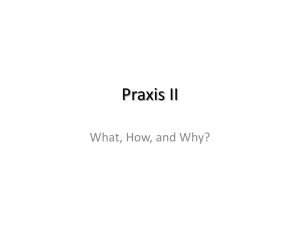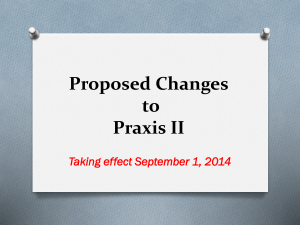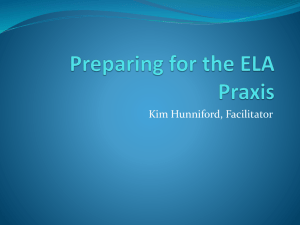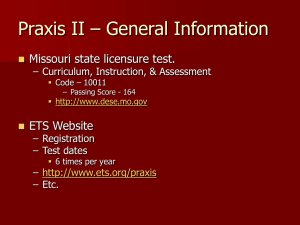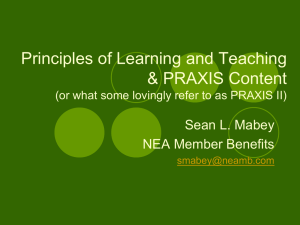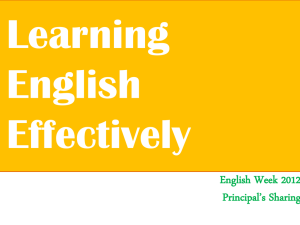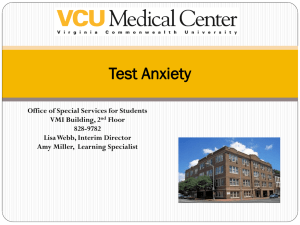Slide show for UOPX Praxis Workshop 1 at Utah Campus
advertisement
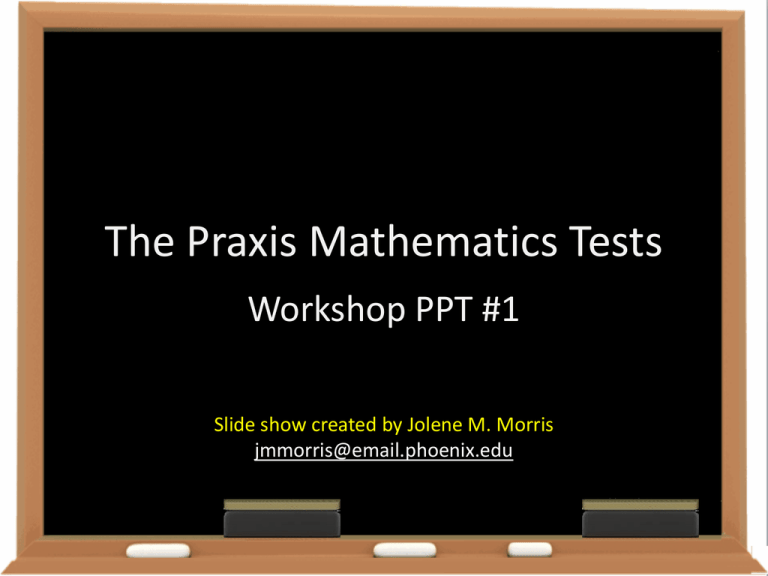
The Praxis Mathematics Tests Workshop PPT #1 Slide show created by Jolene M. Morris jmmorris@email.phoenix.edu Agenda • • • • • Know the test Overcoming test anxiety Studying for the test Tips for taking the test Resources Click an agenda item to go directly to that section of this slide show KNOW THE TEST Praxis is ETS’s shorthand for “Professional Assessments for Beginning Teachers” Educational Testing Service Educational Testing Service (ETS) Teaching and Learning Division P. O. Box 6051 Princeton, NJ 08541-6051 Phone: (609) 771-7395 or (800) 772-9476 Website: http://www.ets.org/praxis/ E-Mail: praxis@ets.org FAX: (609) 530-0581 Contact ETS for ADA and ESL testing information Test-taking Requirements The Praxis I must be passed before completing 12 credits in the Education program (including GEN/200 or COM/516) The Praxis II must be passed and recorded by October 1 before Spring student teaching or by April 1 before Fall student teaching. Praxis Test Video http://www.ets.org/s/praxis/flash/prometric/hesa.html Paper or Computer? Paper • Costs less • Prone to answer sheet marking errors • No technology – can focus on the test • Can mark in the test book • Fewer questions (so each question is worth more) • Average student scores one point higher Computer • • • • Offered almost daily More test centers Video recorded Scored immediately (unofficial) • More questions (so each question is worth less) • More time to complete test • Can mark a question for easy review Computer Test Screen 00:22 Time 31 of 46 Section 2 Review Mark Help Prev Next Praxis I TAAG (Paper) Praxis I TAAG (Computer) Praxis II TAAG OVERCOMING TEST ANXIETY Did you know? Test anxiety is a learned behavior Booklet Provided by ETS http://www.ets.org/Media/Tests/PRAXIS/pdf/01361anxiety.pdf Symptoms of Test Anxiety • • • • • • • • • Physical Psychological Nausea • Cramps • Faintness • Sweating • Headache • Dry mouth Fast heart beat Tense muscles Increased breathing rate Mental blank out Racing thoughts Difficulty concentrating Knowing answers after the test but not while taking it Negative thoughts Reducing Stress Tip #1 of 12 • Not familiar with the test • Learn all you can about the test – – – – What topics are covered on the test? How much time do I have to take the test? How are my answers scored? Is it all right to guess? • Study the TAAG (Test at a glance) prepared by ETS • Prepare early Reducing Stress Tip #2 of 12 • You believe myths about the test • Learn the truth about the test – ignore urban myths and gossip about the test Reducing Stress Tip #3 of 12 • Content not mastered • I don’t know enough to pass the test • Make a study plan with a schedule and stick to it – – – – What specific areas will I work on? When and where will I study? Will I study alone or with a partner? Are there any other helpful resources available? • Build your confidence with study • Keep a log of your study and achievements • Avoid cramming – this is the #1 reason a mind blanks Reducing Stress Tip #4 of 12 • Negative thoughts – I don’t think I can pass the test • Think and act positively • Remember that test anxiety is a learned reaction – prepare and “teach” yourself to overcome the anxiety • Replace negative self-talk with positive thoughts • There is a CUT score of less than 80% -- you don’t have to score higher than anyone else • Monitor your thinking – think positive thoughts when you feel a negative thought beginning Reducing Stress Tip #5 of 12 • Anxiety the day of the test • Eat a balanced meal prior to the test with not too many carbohydrates • Get a good night’s sleep the night before • Relax and think positive thoughts • Plan to arrive early or on time • Avoid any drugs or alcohol that will interfere with your mental ability • Chew gum during the test if allowed Reducing Stress Tip #6 of 12 • I am worried that I will arrive too late for the test • • • • • Prepare in advance (the night before) Get up on time Practice driving to the test site Allow extra time for traffic It is better to arrive early than late Reducing Stress Tip #7 of 12 • Body shows signs of anxiety • I feel weary and exhausted • Take care of your body before the test – Eat well; Exercise; Sleep; Take breaks – Study ergonomics – Learn stretching techniques Click here • See a health care professional if signs are severe • During the test – change positions, stretch, relax for a moment, visualize your goal, and think positive thoughts Reducing Stress Tip #8 of 12 • Tension builds up during study or the test • I feel overwhelmed or tense • Practice tension release exercises – Breathe deeply and exhale slowly – Close your eyes and imagine a peaceful place – Focus on muscle groups and contract and relax them • Schedule time for physical activity • Remind yourself that you have worked hard to prepare for the test Reducing Stress Tip #9 of 12 • I become distracted when I study and as I take tests • Test environment unnerves me • Tune out distractions – – – – – – Wear earphones Avoid arriving too early or too late Choose seat away from possible distractions Sit by yourself; don’t chat with others Remain calm Take a break if necessary Reducing Stress Tip #10 of 12 • Mind goes blank • Stay focused: – Arrive at test with plan for starting, don’t race to answer questions – Tackle questions one at a time – Mark difficult questions to return to later. Find an easy question • Once the test begins, write down any tips or affirmations on your scratch paper • Avoid cramming – this is the #1 reason your mind will go blank Reducing Stress Tip #11 of 12 • I can’t answer a question • Remind yourself that you can pass the test even if you do not answer every question correctly • Skip the question, check it later, and guess if necessary Reducing Stress Tip #12 of 12 • I worry about finishing on time • Be aware of the time as you test • Make adjustments as needed based on time • When taking practice tests, test under the same time conditions as the actual test so you learn to pace yourself Final Words about Test Anxiety Remember that you control the test – not vice versa. If you are calm and take the test with confidence, you will do much better than if you take it with nervous jitters. Use visualization: Imagine yourself walking into a testing room and sitting at the desk. Imagine yourself feeling calm and confident. Imagine yourself facing a difficult questions – let your anxiety surface and practice calming it down. STUDYING FOR THE TEST It is never too early to start studying; the earlier you begin, the more time you will have to sharpen your skills. What to Study • • • • • Refer to TAAG Take a practice test Do an item analysis (see Slide #34) Study those topics you scored lowest Rank topics from lowest to highest on practice test –or- from hardest to easiest to learn • Study the flashcards EVERY day – consider Anki or Flashcards To Go (see Slide #35) • Make notes about important concepts – create more flashcards if necessary When to Study • Make an appointment with yourself EVERY day – If you have a smart phone, put your study time in your calendar • Try to study at the same time each day • Plan your studying during daylight hours • Used “Spaced Repetition” for flashcards (see slide #35) • Do not wait until the last minute to study -- Do not cram Where to Study • Create a specific area for studying • Keep all study materials together so you don’t have to search for them • Choose a spot free from outside distractions Practice Tests • First practice test: no time constraints. See exactly what you already know • Do a test analysis of each practice test to find out where you need to focus your study • Obtain several practice tests – don’t keep taking the same one • When taking a practice test, try to duplicate the test conditions of the real test • Keep track of dates & raw scores • CLASS ACTIVITY—TEST ANALYSIS Using Flashcards • • • • U-Tube Video (excellent) Spaced Repetition Leitner system of boxes Flashcard software – Flashcards To Go (by James Harris) – Anki Jolene’s favorite • Add notes or add your own flashcards • Highlight items you don’t know (assuming you know the rest of the flashcard information) • CLASS ACTIVITY—MAKE FLASHCARDS Develop a Study Plan • • • • • • • Scheduled Realistic Be consistent Do NOT cram Use your time wisely Prepare, don’t procrastinate Post your study plan in the kitchen and in your study area (and in your electronic calendar) • Praxis I® Study Plan on Demand ($15.95) Sample Study Plan (8 weeks) • Week 1: Attend this class (Workshop #1). Make study plan. Prepare study area. Obtain a scientific calculator for Praxis II. Access ALEKS assessment, make flashcards. • Week 2: Attend this class (Workshop #2). Take first practice exam. Do item analysis. Study flashcards daily. Study focus areas in ALEKS. • Weeks 3, 5, & 7: Review PPT from Workshop #1. Study flashcards daily. Study focus areas in ALEKS. Condense your notes. • Weeks 4, 6, & 8: Take another practice exam. Do item analysis. Study flashcards daily. Study focus areas in ALEKS. What Else Should I Do? • Involve your family for support • Wear a noiseless watch, even during practice and study • Bring a set of ear plugs if the testing center doesn’t provide earphones TIPS FOR TAKING THE TEST Develop a test-taking strategy, and then use your strategy. 25 Test Taking Tips Decide before the Wear If Answers Bring Keep you Look earplugs your a are for scientific (except forced notes key or You can answer is no Ittest Be isThere OK aware to write of the in which answer to Dress earphones words for on calculator speed the compare comfortably that scratch up,in ifmay for do you &so questions any penalty for choice you will use the time paper & pace test Any lead Praxis efficiently. ordering) paper are in to layers. II the easily that in are correct Don’t an you in on pure order. guesses. guessing. yourself. booklet. are numerical organized distracted. familiar answer. panic.order. way. with.) (See speaker notes IfIf taking the paper Know The Your Develop you correct first the don’t afour answer strategy answer know types is Can’t No Iftest, you You trick Understand leave are can questions, nervous, take early a so be sure There the IS to of Visualize usually one answer, multiple mark are ofquestions the no correct yourself make choice answer 4the or an 5 “Backing use see but bathroom if the traps chewing time Solving” built break, wisely gum into to answer oval Questions? educated –being questions. you and because patterns. just eliminate successful. guess have (See of to by corresponds towork. the to answer review the is questions. allowed. but… ayour question. speaker subconscious. elimination. choices. findnumber. notes) it. question RESOURCES Where can I go for more help? ETS-prepared Materials http://www.ets.org/praxis/prepare/materials/ University Library • Praxis preparation materials > Test Guides and Preparation > Testing and Education Reference Center > Career Tools > Teaching (Praxis) DEMO University Library • eBooks (search for “Praxis”) DEMO Center for Mathematics Excellence Running Start ALEKS Also at CME: Building Math Confidence eCampus > Utah Campus • • • • • • • Praxis Flashcards 3 PowerPoint slide show Ergonomics handout 8 Study Guides Study Plan handout Test item analysis worksheet …more These resources also available at www.JoleneMorris.com/mathematics/praxis IXL.com Fee for continued use ($9.95 per month) Flashcards • Paper-based (free at Utah Campus) • Electronic (Flashcards To Go, Anki, etc.) These resources also available at www.JoleneMorris.com/mathematics/praxis Videos • • • • KhanAcademy.org/math/ JoleneMorris.com/mathematics U-tube University Library > Building Math Confidence > Math Videos • MathTV.com • NutshellMath.com Books & Practice Tests • • • • ETS Study Guide (in University Library) Cliff Notes for Praxis I (in University Library) ARCO books (in University Library) Jolene’s additional recommendations – Barron’s – XAMonline.com – Mometrix Your money is better spent on ETS materials, but if you choose to buy books, be sure to get the most current version. Praxis Workshop PPT #1 ANY QUESTIONS?
